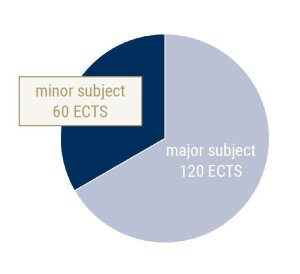
- Degree
- Bachelor of Arts
- Supplement to degree
- minor in a multi-subject bachelor’s programme
- Admission restriction
- without admission restriction (without NC)
- Duration
- 6 Semesters
- Credits/ECTS
- 60
- Teaching language
- German
- Tuition fee
- None
- Semester contribution
- € 272,65
- Start of studies
- Winter semester
- Part-time possible
- Yes
- Institution
- Faculty of Law
You can find more detailed information in the module catalogue for the degree programmeExternal link.
By practising legal modes of thinking, familiarizing yourself with the concepts and content of the discipline of law, and learning how to solve legal cases by applying law to problem scenarios, you will broaden your range of career paths. However, graduating in the minor subject will not qualify you to work in purely legal fields. Your career opportunities will depend on your major subject.
-
University entrance qualification
A university entrance qualification, such as a general secondary school leaving certificate, is required for admission onto the study programme.
More information on university entrance qualifications can be found here.
-
Language requirements
Admission and language requirements for applicants of foreign nationality and without German Abitur: www.uni-jena.de/en/study-orientation-international
Room 2.50
Carl Zeiß Straße 3
07743 Jena
Google Maps site planExternal link
Room 2.41
Carl-Zeiß-Str. 3
07743 Jena
Google Maps site planExternal link
Carl-Zeiß-Str. 3
07743 Jena
Google Maps site planExternal link
University Main Building / SSZ
Fürstengraben 1
07743 Jena
Google Maps site planExternal link
Office hours:
We offer consultations in person, by telephone, and via Zoom. You can make an appointment by calling us on +49 3641 9-411111 (Mondays to Fridays from 9:00 to 11:00) or outside these office hours on +49 3641 9-411200. You can also use our remote help desk.
Consultation hours:
Mondays, Tuesdays, Thursdays and Fridays (9:00 to 12:20), Tuesdays (14:00 to 18:00), and Wednesdays and Thursdays (14:00 to 16:00).
Video chat: Zoom – Video chat Videochat ZeitenMondays to Fridays (12:30 to 13:00) Password ZSB2020 Data protection informationpdf, 101 kb
University Main Building, Room E065
Fürstengraben 1
07743 Jena
Google Maps site planExternal link
Opening hours:
Mondays (10:00 – 12:00)
Tuesdays (13:00 – 15:00)
Wednesdays (10:00 – 12:00)
Thursdays (13:00 – 15:00)
Fridays (10:00 – 12:00)
You can also use our remote help desk at
www.uni-jena.de/service-ssz
or send us your enquiries by post.
Telephone hours:
Mondays to Fridays
(9:00 – 11:00)
Postal address:
Friedrich-Schiller-Universität Jena
Studierenden-Service-Zentrum
07737 Jena
University Main Building
Fürstengraben 1
07743 Jena
Google Maps site planExternal link


